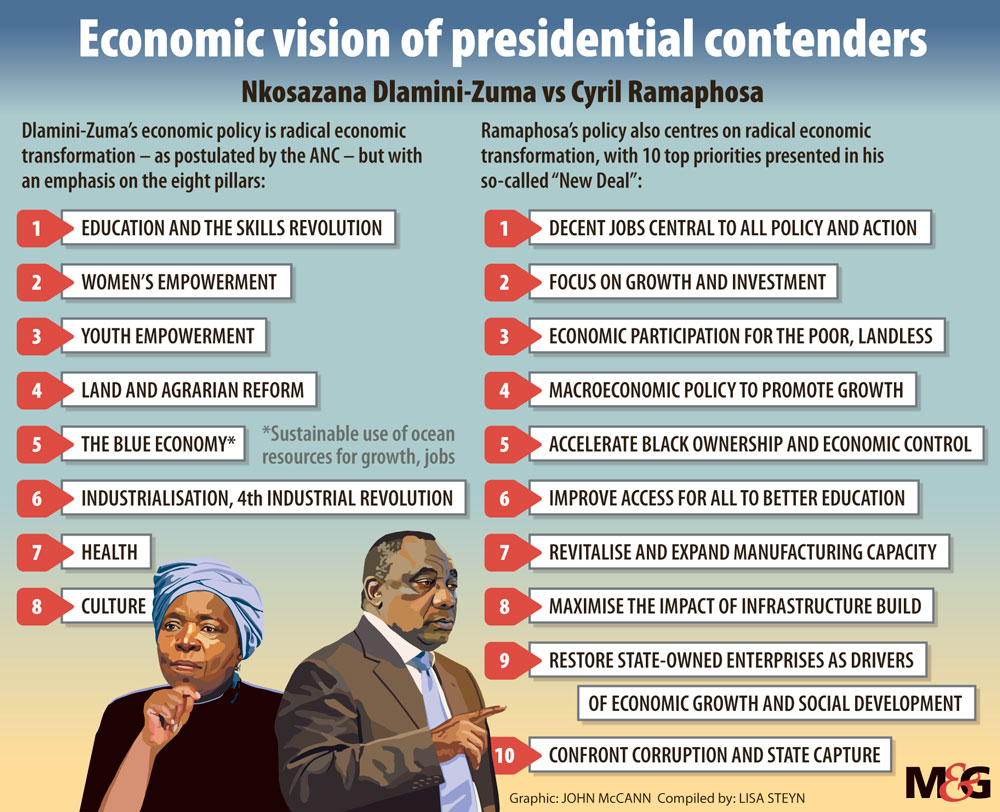Regardless of who wins the presidential race
The emerging frontrunners in the race to the ANC’s 54th national conference next month, presidential hopefuls Nkosazana Dlamini-Zuma and Cyril Ramaphosa have both outlined their economic vision for the country.
Although they have no choice but to agree on the broad policy direction of their party, their approaches display key differences.
Both Dlamini-Zuma and Rama-phosa have provided useful insights into their economic thinking in key speeches. Dlamini-Zuma’s, delivered at the Gordon Institute of Business Science (Gibs) in August, outlined eight key pillars. Her vision is also outlined in a video interview on her social media page.

Ramaphosa, in a speech delivered on November 13 at the ANC Johannesburg region’s economic colloquium in Soweto, proposed a “new deal” and listed 10 priority areas.
Although both appear to agree on many less contentious aspects already included in the ANC’s radical economic transformation discussion documents, there are notable differences on hot topics such land reform, the Reserve Bank and state-owned enterprises.
Both agree on the importance of land redistribution. The dispossession of land was one of the biggest harms of apartheid and land redistribution is critical for economic inclusion, Ramaphosa said.
Dlamini-Zuma, in her Gibs speech, said: “With regard to the ownership of our land, the concept of the willing buyer and willing seller must be rejected and replaced by land restitution without compensation.”
Ramaphosa, commended the strength and independence of the Reserve Bank. Dlamini-Zuma said it must not be allowed to hold on to an “amorphous independency” but must be aligned to support and implement government economic transformation.
On flailing state-owned entities (SOEs), Ramaphosa has prioritised restoring their stability, saying that strong boards and executives must be appointed and private capital should be considered on a co-investment or strategic partnership basis.
For Dlamini-Zuma, who places a particular emphasis on the role of the developmental state, SOEs must be instrumental in creating employment. She suggests they should drop the requirement of previous experience for entry-level work seekers and assist in training the youth.
Ramaphosa is not scared to talk about tackling corruption and state capture, even listing it as one of his priorities in the new deal, but Dlamini-Zuma makes no direct mention of these. Ramaphosa says the corrupt must be removed, and the criminal justice system must be restored. Every rand stolen must be returned and paid into an “anti-corruption appropriation fund”.
Ramaphosa has suggested rationalising the size of the Cabinet and ensuring that the best and the brightest public servants are appointed. Dlamini-Zuma also proposes that ministers who cannot perform and meet targets should lose their jobs.
Although there is a great deal of consensus in the party on its policy direction, it remains in flux until this is debated, finalised and adopted at the party’s conference, which kicks off on December 16.
Contentious proposals such as expropriation of land without compensation and nationalising the Reserve Bank were tabled late at the ANC’s policy conference at Nasrec, Soweto, in July, and must be discussed further at next month’s conference.
Regardless of who wins the presidential race, no ANC president can override the party’s economic policy adopted at the conference, said Enoch Godongwana, the head of the ANC’s subcommittee on economic transformation. “The policy is like a menu, and one can prioritise items from that menu. That is the flexibility the ANC president has.”
A spokesperson for Dlamini-Zuma’s campaign said, whether the more contentious issues — such as expropriation without compensation or nationalisation of the Reserve Bank — are accepted or rejected, Dlamini-Zuma, as a disciplined cadre of the movement, would abide by the decision. She “has no other policy positions outside those adopted by the ANC and its structures”, the spokesperson said.
Ramaphosa, too, in whatever position he serves, will also have to implement the policy of the ANC.
As reflected in their speeches, both Dlamini-Zuma and Ramaphosa appear to agree on a wide range of issues. Naturally, they both say radical economic transformation must be implemented urgently to effect the economic emancipation of all South Africans and address inequality.
They both advocate access to free higher education for those who cannot afford it and that the development of infrastructure should be continued, if not accelerated.
They also believe that revitalising the manufacturing industry, with particular focus on mineral resources and agriculture, is the key to job creation and economic growth. Both agree that import substitution must be looked at to create jobs and grow the domestic industry.
To Page 2